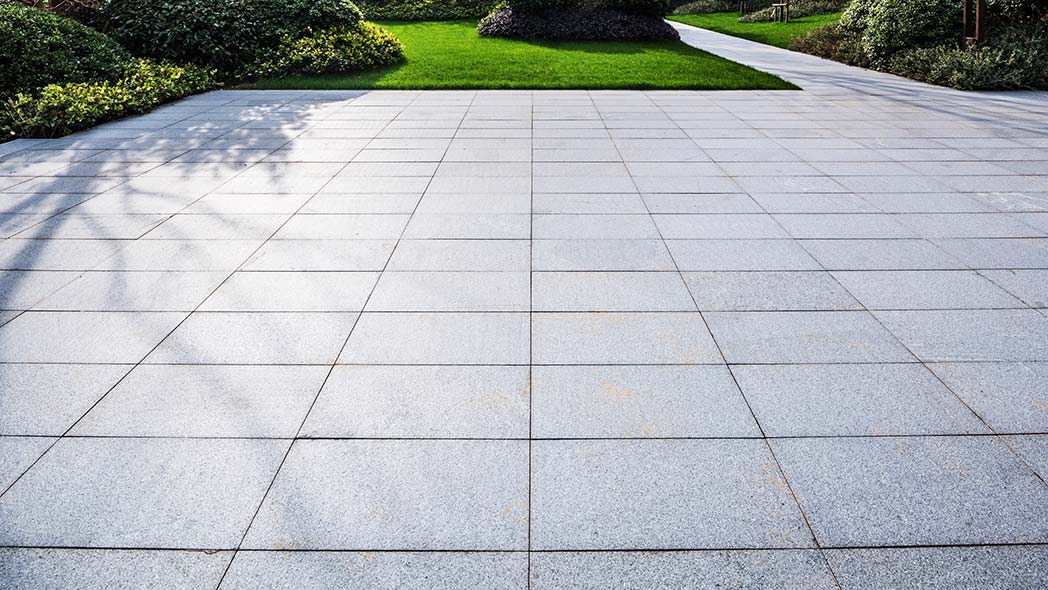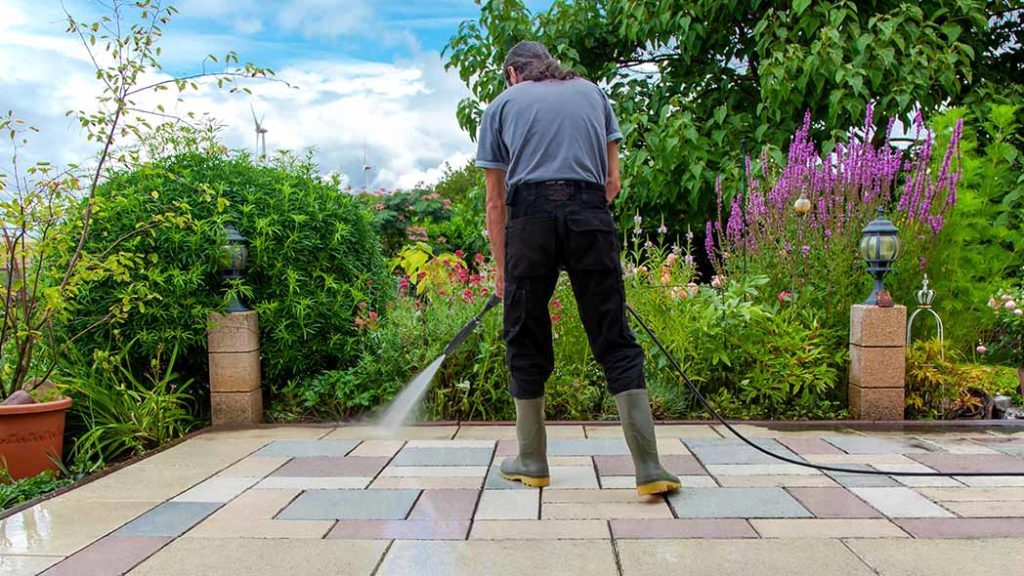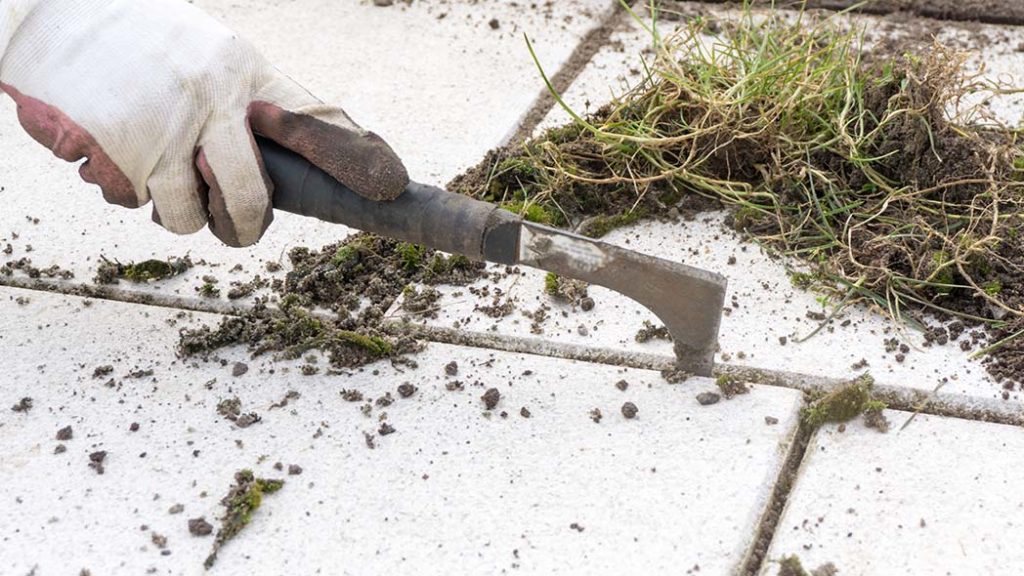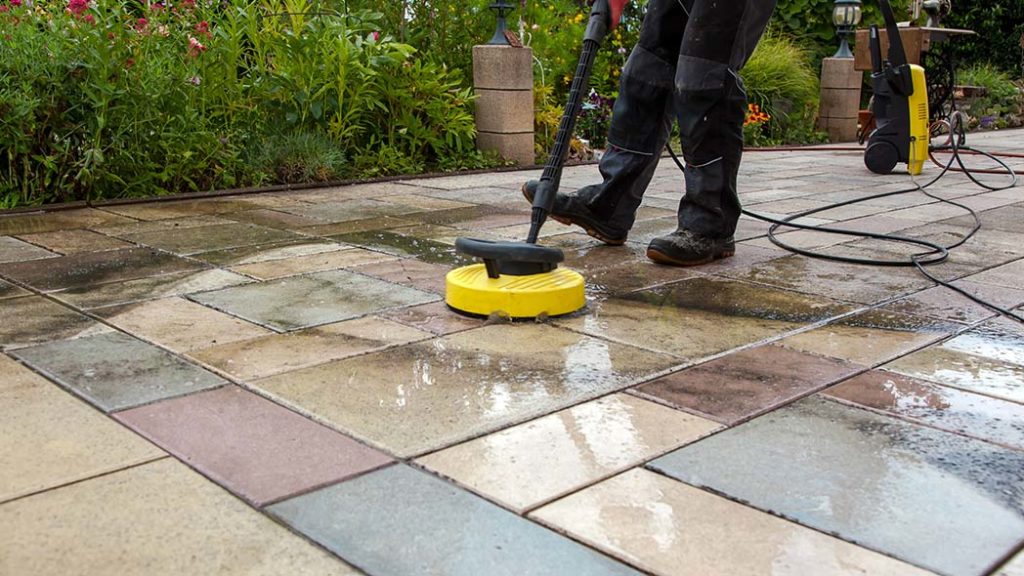
Photo: hrui / iStock.com
Springtime. It’s a magical moment when you open your patio door for the first time and step into the sun without a winter coat. You take a deep breath and feel a slight slipperiness underfoot. Indeed, your beautiful natural stone patio has been covered with a delicate layer of algae and moss during the winter. You jot down a note in your smartphone: clean patio on Saturday. After all, you bought that great pressure washer last autumn. Although some say it’s not a good idea. We’ll tell you what really matters when it comes to cleaning patio slabs.
Content
- 1 Cleaning the Patio: Study Before You Try
- 2 Cleaning Washed Concrete Slabs: You Can Use High Pressure Here
- 3 Cleaning Patio Stones: The Four Basic Methods
- 4 Cleaning Stone Slabs: Less Is More
- 5 Cleaning Concrete Slabs
- 6 Cleaning Patio Tiles and Balcony Tiles
- 7 Cleaning Pathway Slabs
- 8 Cleaning Patio Slabs with Home Remedies
- 9 Experience the best service with planeo - because you need it!
Cleaning the Patio: Study Before You Try
Moss, algae, grease stains, and other dirt leave marks on the floor of your outdoor living room throughout the gardening year and over the winter. If you don’t remove these marks, the dirt will multiply because more unwanted material will stick to the foreign particles. You’ll have less work if you use suitable cleaning agents every year. But which ones are they? Your friends are right, the pressure washer is not a universal tool. Nor can a universal answer be given to the question of which agents are best for cleaning the patio. It depends on the type of stones you have used to design your outdoor area.
Cleaning Washed Concrete Slabs: You Can Use High Pressure Here
Washed concrete slabs bring a robust retro charm to the garden. Robust, yes - because this flooring can withstand a lot. That’s why it can be exposed to the direct power of a pressure washer nozzle. But first, grab a broom and sweep all coarse dirt off your patio. If more stubborn deposits have formed on particularly damp areas, remove them with a wire brush. Now get your pressure washer out of the garage. You don’t need a patio attachment. Washed concrete slabs can withstand the direct power from the nozzle. However, the process of cleaning washed concrete slabs is labour-intensive. You need to protect house walls, windows, and the surroundings from flying dirt particles. Lower the shutters, always work away from the wall, and possibly hang protective tarpaulins. Alternatively, washed concrete slabs can also be cleaned with a brush and scrubber. It is advisable to wet them beforehand. Joint material that has been washed out during the scrubbing or pressure washing should be replaced. Joint sand is suitable for this purpose.

Cleaning Patio Stones: The Four Basic Methods
First things first: Chemicals do not belong in the patio cleaner’s equipment. And the popular household remedy salt should stay in the cupboard. Why? Because the patio, like the sidewalk, is a sealed surface. Aggressive cleaning agents enter the soil and groundwater through the joints when you clean patio stones. They poison the environment, harm plants, and wildlife in your garden. Depending on the type of stone patio surface, you have four options for the spring clean-up.
- Trust in the power of your muscles and use a joint scraper and brush.
- Also for the muscle faction: prepare a scrubber, hot water, and a household remedy.
- Use the pressure washer.
- Scrub your patio with a mixture of soapy water and sand.
Joint Cleaning: A Special Chapter
The joint between the patio slabs is a special biotope. Each year (and each week in the spring months), grasses and weeds settle there. If possible, avoid using the pressure washer for joint cleaning. Because the sharp jet will inadvertently wash out the joints. This creates additional work as the washed-out joints need to be refilled with joint sand or mortar. It’s better to clean the joints mechanically with the good old joint scraper. Vinegar and salt are forbidden for environmental reasons. As a household remedy for weed removal in joints, cautious experts recommend at most boiling water. Flame devices are an option. However, you should do a burn test in an inconspicuous spot, as natural stones can be discoloured and damaged.

Cleaning Stone Slabs: Less Is More
Natural stone is the most valuable material for a stone patio. It fascinates with its natural patterns, the uniqueness of each slab, and the interplay of the whole. Natural stones maintain their colour and pattern permanently.
But: The natural texture of the surface, with its small irregularities and notches, particularly invites plants and dirt to settle. Therefore, cleaning natural stone slabs in the spring is a must. And another but: Stay away from chemicals and aggressive cleaners. Incorrect surface treatment causes natural stone to become dull or scratched faster than you’d like. Use gentle substances like soap or mild household remedies for cleaning stone slabs. Special preparations should only be used if declared by the manufacturer. Testing the product in an inconspicuous area is still advisable. Pressure washers are a tempting tool for amateurs. Here’s a third but: The aggressive device stirs up a lot of dirt. Additionally, the concentrated water jet roughens the stone surface and makes it more susceptible to new layers of dirt.
Cleaning Concrete Slabs
Experts know what they’re talking about. Amateurs are surprised. For example, concrete. It’s a material for eternity. Insensitive, resistant, easy to maintain - so the amateur thinks. Those who have to clean the concrete slabs of their patio think differently. Yes, concrete is durable. Yes, concrete forgives a lot. But this material is not easy to maintain. Its porous surface absorbs moisture like a sponge. That’s why stains easily form on concrete slabs if leaves or other particles remain for a long time. A pressure washer can be used for cleaning concrete slabs. However, use it judiciously. Ideally, use a device to which an attachment with rotating brushes can be fixed, designed for gentle natural stone and concrete cleaning. Do not use too much water. If you use the pressure washer without the special attachment, make sure to keep a working distance of at least 30 centimetres from the slabs. Be particularly careful in the joint area to avoid washing out under the water pressure.

Cleaning Concrete Slabs Without a Pressure Washer
Concrete stones and slabs were cleaned even before the invention of the pressure washer. And this, through muscle power and simple cleaning agents. Many experts consider the method of cleaning concrete slabs without a pressure washer to be the only correct one. The goal is to use as little water as possible. Therefore, professionals rely on the "peeling" effect of quartz sand. Simply spread the sand generously over the concrete slabs with a broom. The abrasive action will remove coarse dirt. For more stubborn areas, use a scrubber and some warm water. By the way, concrete slabs benefit from subsequent impregnation.
Cleaning Patio Tiles and Balcony Tiles
For cleaning patio tiles, the same precautions apply as for cleaning patio slabs. Avoid the use of harsh chemicals and high-pressure washers. While it’s true that fully grouted ceramic tiles can withstand the concentrated water jet, it is still not recommended to use a pressure washer on a balcony or a small patio, as the collateral damage (dirty walls and glass surfaces) would require its own intensive cleaning effort. Treat the well-grouted patio tile floor the same way you would clean an indoor tiled surface. After removing all dirt with a stiff broom and scraping off any adhered particles with a squeegee, you’ll need a microfiber cloth to mop the floor. Then polish with a soft cotton cloth.
Cleaning Pathway Slabs
Garden paths and the pavement in front of the house also benefit from cleaning. Just like patio slabs, plants and dirt cover the stones. This doesn't look good and makes the ground slippery when wet. Which cleaning method you choose depends on the material from which the pathway slabs are made. For sensitive natural stones, you should avoid the pressure washer, as it roughens the stone's surface. According to the principle of Velcro, dirt particles will then stick much faster. The best way to go about it is with a scrubber, root brush, and warm water, possibly with the addition of a mild cleaner. Don’t forget the joint scraper. Before you clean the pathway slabs, you should deal with the weeds growing in the narrow cracks between the stones.
Cleaning Patio Slabs with Home Remedies
Why are home remedies called that? Because you have them at home. And if not, you should quickly stock up. Laundry detergent, soda, baking powder, and the like can always be useful, even outside the terrace cleaning season. Home remedies are cheap and, in most cases, environmentally friendly. Plus, you don't have to search the city or the internet for them, as they’re available in any supermarket. Here are some tried-and-tested substances that have already helped our grandmothers and are perfect for your project of cleaning patio slabs with home remedies.
Cleaning the Patio with Soda
Aggressive chemical cleaners are no longer in vogue - that’s why soda, also known as washing soda, is making a comeback. You can find it in any well-stocked supermarket, drugstore, and pharmacy. For light dirt, dissolve a tablespoon of soda in a litre of water and pour the mixture over the stone slabs. Let it sit for an hour and then rinse with clear water. For stubborn dirt, mix a paste of 100 grams of soda, 4 tablespoons of cornstarch, and 5 litres of warm water. Spread it over the slabs, let it soak for five hours, then scrub and rinse with clear water. Caution: soda can irritate skin and eyes. Never overdose. Wear gloves and protective goggles. Soda is not suitable for natural stone terraces. Used carefully, cleaning the patio with soda is a simple, practical, and environmentally friendly option.
Cleaning the Patio with Vinegar
Vinegar was considered a secret weapon against weeds and the like by old gardeners. Especially in combination with salt. It is not recommended to use these two home remedies, and especially not their combination, for several reasons. First, vinegar harms the microorganisms in the soil and contaminates groundwater. Second, it attacks stone slabs and leaves - especially on limestone - a stained surface. Third, it is even forbidden to use the vinegar-salt cocktail - fines are at stake. And fourth, the smell was always unbearable. So it is advisable to avoid cleaning the patio with vinegar.
Cleaning Patio Slabs with Laundry Detergent
Laundry detergent is a good ally in the fight against green deposits and dirt particles on the stone terrace. Always choose a biodegradable product to avoid polluting the environment. Alternatively, you can use baking soda - an excellent all-purpose cleaner for the home and garden. First, dampen your patio slabs with warm water. Then sprinkle the detergent over all the dirty stone surfaces. Now grab a brush and scrub away all particles and deposits. Finally, rinse the clean stones with clear water. This way, you can quickly and effectively clean your patio slabs with laundry detergent.
Cleaning Patio Slabs with Baking Powder
No, baking powder is not baking soda. But baking soda is an important component of baking powder. It also always contains an acidic additive, such as citric acid. Baking powder can be used to clean patio slabs just like laundry detergent: first moisten the slabs with warm water, then generously sprinkle the baking powder over them. Let it sit. Then scrub the patio, sweep up the remaining baking powder, and rinse the stones with clear water. Caution: patio slabs made of soft materials like terracotta should not be cleaned with baking powder. Otherwise, cleaning patio slabs with baking powder is highly recommended.
Experience the best service with planeo - because you need it!
No matter what challenges you face with your project, planeo provides you with the right solution. Benefit from the advantages of our services:
- Free samples⁴ for many of our products: Order up to 7 samples at no cost, for instance, such as our wooden decking or WPC decking.
- Express delivery² - for urgent projects and quick decisions.
- Expert advice¹ - We offer professional consultation through our contact page or answer your questions directly in the comments.